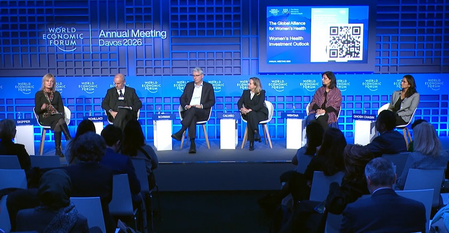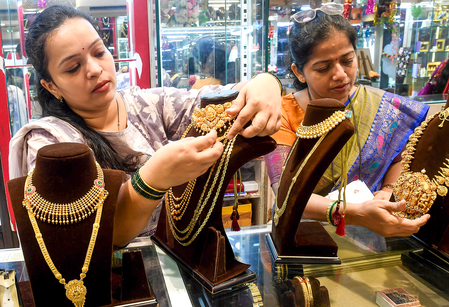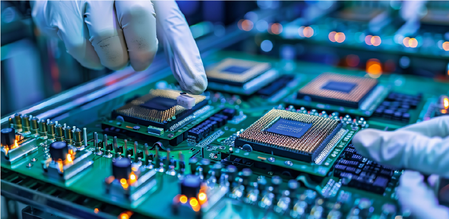Technology
WEF 2026: Accessibility, affordability, and personalisation key to boost women’s health, say experts

New Delhi, Jan 22 (IANS) Improving accessibility, affordability, and tailoring treatment and diagnostics to women's needs are some of the crucial measures to closing the health gap for the fairer sex by 2030, said experts at the ongoing World Economic Forum 2026 in Davos.
Women spend 25 per cent more of their lives in poorer health than men due to delayed diagnoses and limited access to appropriate care.
At a session titled " Breakthroughs in women's health, the experts highlighted how insufficient investment in sex-specific research and innovation for women results in preventable mortality, morbidity, and loss of economic potential -- estimated to be $1 trillion globally.
The panel unanimously pointed out that the focus needs to be on the human side of implementation.
“The greatest innovations are the ones that will end up being accessible, affordable, and used by women around the world,” said Gargee Ghosh Chasin, President, Global Policy and Advocacy, Gates Foundation.
“While invention is critical, access and use are equally critical. And that's what makes the difference between product and impact,” she added, while mentioning incredible innovations specific to women’s health, such as the HPV vaccine for cervical cancer, an AI-based ultrasound that will bring early diagnosis of high-risk pregnancy, and a microarray patch for contraception.
Sania Nishtar, Chief Executive Officer, Gavi-The Vaccine Alliance, stated that more than just innovation, it is important to translate science and evidence into policy, and then policy into pilots, and then pilots into scalable delivery.
“Innovation has to be matched with delivery capability. And the challenge is that if you do not have that delivery capability, if you do not have sustainable financing, you're unable to use innovations for the impact that they're intended to have,” she added.
Nadia Calviño, President, European Investment Bank, stressed the importance of primary health and the distribution of the preventative treatments to women.
“Primary health is the starting point for a healthy society. Of course, women's health is the basis for a healthy society, a stable society. So, I really think we have to put a lot of focus on that, the family doctors, the way that we can get these medicines and these preventative treatments to every woman around the world,” Calviño said.
Orazio Schillaci, Minister of Health, Ministry of Health of Italy, called for increasing the number of clinical trials tailored for women and personalising treatment for women. Schillaci also mentioned the potential of artificial intelligence in enhancing the health sector.
--IANS
rvt/
Gold, silver prices ease after Trump backs off from tariff threats on Europe

New Delhi, Jan 22 (IANS) Gold futures on the MCX dipped close to 1 per cent on Thursday from record high in the previous session due to profit booking, amid easing geopolitical tensions and strengthening of dollar.
Fears of a US‑EU trade conflict moderated after US President Donald Trump softened his tone on acquisition of Greenland.
MCX gold February futures dipped 0.78 per cent to Rs 1,51,665 per 10 grams. Meanwhile MCX silver March futures dipped 0.62 per cent to Rs 3,16,509 per kg.
Gold rates also dropped in the international futures market, with US gold futures consolidating near $4,790–$4,800 per troy ounce, after registering a fresh record high above $4,887 earlier in the week on COMEX.
The current dip reflects healthy profit-booking amid easing tariff fears, but the broader uptrend remains powerful, analysts said.
Open interest data in the futures market showed a decline in 'OI level', currently at 9870 lots, with price showing upside momentum. According to Aamir Makda, Commodity and Currency Analyst at Choice Broking, this trend indicated a long unwinding by traders, with no addition in long positions.
Meanwhile, COMEX silver traded firm near $92–$93 after recently touching record highs above $95.80.
Analysts said that robust industrial demand in sectors such as solar, EVs, AI, electronics and safe-haven flows amid tightening global supply powers the rally.
US dollar traded in a stable tone after Trump informed that tariffs won't be imposed on European countries over Greenland.
The dollar index rose to 98.81, making gold slightly expensive for overseas buyers.
At the World Economic Forum in Davos, Trump said that force would not be used to acquire the Arctic island, adding that he had “formed the framework of a future deal with respect to Greenland,” with NATO Secretary General Mark Rutte.
Investors also focus on upcoming cues from November Personal Consumption Expenditures (PCE) data, the Fed's preferred inflation gauge, and weekly jobless claims, both due later in the day.
Most market participants expect the US Federal Reserve to maintain interest rates unchanged at its January 27-28 meeting. However, two more cuts are expected later in the year.
—IANS
aar/na
India’s AI adoption to generate $1.7 trillion in economic value by 2035: Report

New Delhi, Jan 22 (IANS) As India’s semiconductor industry scales up, its adoption of artificial intelligence (AI) is projected to generate $1.7 trillion in economic value by 2035 and reshape industries across the economy, a new report has said.
A KPMG report, launched at the World Economic Forum 2026 in Davos, said that India’s responsible AI scaling gained support from robust data governance frameworks, sectoral adoption in healthcare, agriculture, education, and defence, and the creation of the IndiaAI Safety Institute.
“India’s emergence as a pivotal force in global trade, technology, and sustainability is underpinned by bold investments in semiconductor manufacturing and rapid adoption of artificial intelligence (AI),” the report said.
The business advisory firm highlighted India's achievement in the sector, such as approval of six semiconductor fabrication plants with an outlay of $1.3 billion and allocation of $2.2 billion for deep‑tech research and development.
Government-supported flagship initiatives such as the India Semiconductor Mission and Semicon India are accelerating chip‑making infrastructure, testing and advanced packaging, the report said.
The report highlighted over 38,000 GPUs deployed under the IndiaAI Mission, over 6 million people employed in the technology and AI ecosystem and that 89 per cent of new startups in 2024 leveraged AI, the report said.
“India’s transformation is remarkable. What we’re seeing is more than economic growth, it’s about building trust and shaping the future of global collaboration. From advanced manufacturing and digital infrastructure to clean energy and AI, India is building an ecosystem that drives resilience and innovation at scale,” said Bill Thomas, Global Chairman and CEO, KPMG International.
“The country’s ability to turn ambition into action is what stands out, delivering real progress that opens new opportunities for businesses worldwide,” Thomas added.
India’s leadership in digital infrastructure, sustainability, and advanced technologies like semiconductors and AI sets new benchmarks, according to Yezdi Nagporewalla, Chief Executive Officer, KPMG in India.
The PLI schemes have attracted $22.2 billion, generating $207.9 billion in incremental production and creating 1.26 million jobs, and India reached a 50 per cent non‑fossil fuel share in installed capacity by June 2025, the report noted.
--IANS
aar/na
India 2nd country globally to integrate Mobile Stroke Units with emergency medical services: ICMR

New Delhi, Jan 22 (IANS) India is the second country globally to integrate Mobile Stroke Units with emergency medical services to boost treatment in rural areas, said Dr Rajiv Bahl, Secretary, Department of Health Research and Director General, ICMR.
Bahl stated this as the Indian Council of Medical Research (ICMR) handed over two Mobile Stroke Units (MSUs) to the Assam government, marking a major shift from stroke patients in remote areas having to travel to hospitals to hospitals reaching patients.
The initiative is part of an ICMR-funded initiative to study ‘Stroke Care Pathways’ in the region. After the pilot phase ended, the ICMR donated the units to ensure that people of Assam continue to receive rapid treatment for cerebrovascular emergencies.
“Mobile Stroke Units were first developed in Germany and later evaluated in major global cities. India has evaluated such units in rural, remote, and difficult terrain in Northeast India. We are also the second country globally to report successful integration of an MSU with emergency medical services for treating rural acute ischemic stroke patients,” Bahl said.
Stroke is one of the leading causes of death and long-term disability in India and requires timely care within the golden hour.
“The handover strengthens Assam’s emergency response system and ensures continuity of this life-saving service under state ownership,” said P. Ashok Babu, Secretary & Commissioner, Health, Assam.
He noted that the collaboration with ICMR has enabled faster treatment, better coordination, and improved outcomes for stroke patients, and provides a strong foundation for expansion.
The MSU is a mobile hospital on wheels, equipped with a CT scanner, teleconsultation with specialists, point-of-care laboratory, and clot-busting drugs, enabling early diagnosis and treatment of stroke at or near the patient’s home.
The Northeast has a disproportionately high burden of stroke. Difficult terrain, long distances, and limited access to specialised care have historically made timely stroke treatment challenging.
To address this, the ICMR established a neurologist-led stroke unit at Assam Medical College & Hospital, Dibrugarh, and physician-led stroke units at Tezpur Medical College Hospital and Baptist Christian Hospital, Tezpur.
The Mobile Stroke Units were embedded into this pre-hospital stroke care pathway.
The model reduced treatment time from nearly 24 hours to about 2 hours, reduced deaths by one-third, and reduced disability by eight times, the Ministry said.
--IANS
rvt/
WEF 2026: AI won’t replace human jobs, but augment human employees at scale, say experts

New Delhi, Jan 22 (IANS) Artificial intelligence would not replace human jobs but can only reshape work by automating tasks, said leading business executives of tech companies at the ongoing World Economic Forum 2026 in Davos.
Kian Katanforoosh, Founder and Chief Executive Officer, Workera, said language matters when describing AI.
“Personally, I’m not a fan of calling AI agents or co‑workers,” he told a WEF session, arguing that AI excels at tasks but can't outperform humans at “entire jobs”.
Humans, by contrast, perform “100s of tasks at times.” “Predictions that AI would wholesale replace jobs have so far been wrong,” he added.
Munjal Shah, co‑founder and CEO of Hippocratic AI, agreed that AI will augment human employees at a massive scale rather than replace them.
He forecasted a future of “8 billion people and 80 billion AIs,” saying most systems will enable new use cases rather than replacing existing human roles.
He points to an AI system that called thousands of people during a heatwave, guiding them to cooler locations and offering health advice. Getting it right required rigorous testing. “We have models that check models that check models,” he said.
Kate Kallot, Founder and CEO of Amini, said AI firmly remains a “tool” that cannot make value‑based decisions.
It “can’t choose the best outcomes” because it doesn’t yet have the right inputs, Kallot said.
Christoph Schweizer, CEO of BCG, said the experience of working with AI can feel like collaborating with a co‑worker.
“You are now in a reality where it feels like a co-worker, whether you call it that or not,” he said.
Schweizer argued that success depends on how companies change their organizations, not just their tools. “They will succeed if they really change how their people work,” he said.
He urged AI to be treated as “a CEO problem” that cannot be delegated.
Enrique Lores, President and Chief Executive Officer, HP, urged balance in AI usage with restraint on being more demanding with the AI coworkers than with human employees.
In HP’s call centres, AI sometimes gives the wrong answer, yet overall accuracy is higher than before, and customer satisfaction has improved, he added.
--IANS
aar/rvt/
Defence to space, India’s vibrant startup ecosystem becomes foundation of nation building

New Delhi, Jan 15 (IANS) As the nation marks the decade of the ‘Startup India’ initiative, the revolution is no longer merely an economic phenomenon; it has become a nation-building instrument, reshaping how the India creates capability, opportunity, and confidence for the next century.
‘Startup India’ was launched on January 16, 2016 by Prime Minister Narendra Modi as a transformative national programme to nurture innovation, promote entrepreneurship and enable investment-driven growth, with the objective of making India a nation of job creators rather than job seekers.
Today, the transition from a global “back-office” to an “innovation architect” is not just about sovereignty in defence or technology — it is about reconstructing national institutions, decentralising opportunity, and embedding innovation into the everyday functioning of India.
Under the PM Modi government, what began as ease-of-doing-business reforms has evolved into a capability-building architecture for Viksit Bharat 2047.
For example, defence startups are often viewed through the lens of security, but their deeper contribution is to institutional resilience and industrial depth.
Through iDEX, startups have been integrated into the Armed Forces’ procurement and problem-solving processes, something unprecedented in India’s post-independence history. This has transformed defence from a closed, import-oriented sector into a distributed national manufacturing ecosystem.
The impact is visible and measurable. Defence production has surged, exports are at record highs, and private innovation is finally translating into real orders. Over 788 industrial licenses have been issued to 462 companies, dramatically increasing the private sector participation.
Today, the private sector contributes nearly 23 per cent of India’s total defence production, with more than 16,000 MSMEs integrated into the defence ecosystem. What was once a slogan, Atmanirbharta, has become a nationwide movement.
Before 2014, defence startups in India were virtually non-existent. Today, over 1,000 defence startups operate across the country. These startups are not peripheral players; they are developing mission-critical technologies once sourced from abroad, according to official data.
In a move to end dependency on foreign GPS, India is developing an indigenous Quantum Positioning System (QPS) with the help of startup for the Indian Navy. Indian quantum deeptech startup QuBeats has won the prestigious ADITI 2.0 Defence Challenge with a grant of $3 million to build this tech for our Navy.
Similarly, India’s armed forces have shifted from foreign-component-heavy drones to fully indigenous drone systems, which were deployed during precision strikes in Operation Sindoor, designed and manufactured in India, including hubs like Bengaluru.
The government has taken a new step in unmanned defence, the Indian Army signed a Rs 168 crore contract with Bengaluru-based startup NewSpace Research & Technologies under iDEX for solar-powered surveillance drones.
This marks the first time the Army is inducting solar-powered unmanned aircraft, overcoming endurance limitations of battery- and fuel-based systems.
Notably, expanding the Nation’s Nervous System (space and AI), space and AI startups are extending the sensory and cognitive infrastructure of the country.
The number of space startups was just 1 in 2014. After 2014, opening the space sector to private participation has led to the emergence of over 382 space startups. Today, India’s space startups are strengthening India’s sovereign space intelligence.
Bengaluru-based Pixxel has launched the first satellites of its Firefly constellation, the nation’s first commercial satellite constellation, delivering world-leading hyperspectral imaging.
Similarly, the upcoming launch of GalaxEye’s Mission Drishti will provide the nation with "sovereign eyes" with the world’s first multi-sensor Earth-observation satellite.
In artificial intelligence, the IndiaAI Mission is ensuring India does not merely consume global AI tools but builds its own Sovereign AI ecosystem. Startups like SarvamAI were selected in 2025 to develop India’s first sovereign LLMs, trained on Indian languages and hosted on Indian servers.
To democratise AI innovation, the government has onboarded over 38,000 GPUs, offering subsidised access to startups at just Rs 65 per hour, enabling even small-town founders to train world-class AI models.
Recognising that true nation building requires indigenous “brains,” the government launched the India Semiconductor Mission (ISM) and the DLI scheme. Startups like Netrasemi, supported under the chip design programme, have secured Rs 107 crore in VC funding to develop chips for smart vision, CCTV, and IoT applications.
Simultaneously, in 2021, the government decided to ease the mapping policy and allowed local startups and businesses to collect, generate, store, publish and update geospatial data of the country, but within its territorial boundaries.
This has unlocked innovation across agriculture, infrastructure, and governance. Startups like Satsure are using satellite imagery to provide "Credit Scoring" for farmers. Some startups are using satellite imagery, AI and data science to deliver plot-level farm advisories to smallholders.
Moreover, India’s biotechnology sector has emerged as a key pillar of economic growth and innovation. The sector’s regional landscape is also evolving.
BIRAC’s Incubation network has expanded to comprise 75 BioNEST Centres and 19 E-YUVA Centres, contributing to a cumulative incubation space exceeding 9,00,000 sq. ft. and supporting over 3,000 entrepreneurs and startups, more than 1,300 IPs have been filed by the incubatees, and over 800 products have reached various stages of market deployment.
The dismantling of the Inspector Raj and its replacement with an Innovation Raj did more than reduce friction, it restored agency to Indian entrepreneurs. Through Startup India, startups were formally acknowledged as nation-builders, not regulatory subjects. The result is an ecosystem focused not just on valuation, but on value creation for society.
Meanwhile, according to a Prime Minister's Office (PMO) statement, PM Modi will interact with members of India’s vibrant startup ecosystem on Friday. Select startup representatives will share insights from their entrepreneurial journey. Prime Minister will also address the gathering on this occasion, the statement added.
--IANS
na/
Global backlash forces Elon Musk-led X to disable Grok’s objectionable image generation feature

New Delhi, Jan 15 (IANS) After facing significant global backlash, the Elon Musk-led X social media platform on Thursday disabled Grok's objectionable image generation feature.
The artificial intelligence-enabled chatbot Grok will no longer be able to generate objectionable images of women, regardless of whether the user has a premium account.
“We have implemented technological measures to prevent the Grok account from allowing the editing of images of real people in revealing clothing such as bikinis. This restriction applies to all users, including paid subscribers,” the platform’s safety account said in a post on X.
xAI faced heat from several countries over Grok's "Spicy Mode" feature, which allowed users to create sexualised deepfakes of women and children using simple text prompts such as "put her in a bikini" or "remove her clothes." Multiple countries either blocked access to the chatbot or launched their own probes.
The Ministry of Electronics and Information Technology (MeitY) sought an action-taken report from xAI, and the Attorney General from the US state of California launched an investigation into the developer of Grok.
Further, a coalition of 28 civil society groups on Wednesday submitted open letters to the CEOs of Apple and Google, urging them to ban Grok and X from their app stores amid the surge in sexualised images.
Now, X has also restricted the ability to generate and edit images to paid users. Earlier, Grok had limited the generation of such images only to paid users.
“Image creation and the ability to edit images via the Grok account on the X platform are now only available to paid subscribers,” X said, stating that it “adds an extra layer of protection by helping to ensure that individuals who attempt to abuse the Grok account to violate the law or our policies can be held accountable”.
The platform also noted that it will take action to remove high-priority violative content, including Child Sexual Abuse Material (CSAM) and non-consensual nudity. Appropriate action will be taken against accounts that violate the rules.
In December, the IT ministry had asked X to “remove or disable access, without delay, to all content already generated or disseminated in violation of applicable laws".
The ministry had also directed X to enforce its terms of service and AI usage restrictions, and take “strong deterrent measures”, including suspending or terminating accounts that used Grok to create sexually explicit images of women and children.
X reportedly removed nearly 3,500 pieces of obscene content and sexually explicit images generated using Grok’s image generation capabilities in India. The platform also identified and barred about 600 users who had misused the AI chatbot to generate sexually explicit images.
--IANS
rvt/
Institutional investment in India’s realty sector reaches record $8.1 billion, up 19 pc

New Delhi, Jan 15 (IANS) Institutional investment in India’s real estate market reached a record $8.1 billion in 2025, anchored by an all-time high quarterly investment of $3.73 billion in the fourth quarter, a report said on Thursday.
The report from Vestian said the total institutional investments in 2025 was up 19 per cent from 2024 and 88 per cent from 2023, with fourth‑quarter inflows rising 112 per cent from the previous quarter.
Commercial assets accounted for the largest share, drawing 63 per cent of total investments in 2025, up from 35 per cent in 2024 and rising 113 per cent in value to nearly $5.1 billion, the report said. Commercial assets also attracted 61 per cent of fourth‑quarter inflows and were valued at $2.3 billion, owing to demand from global capability centres, the firm said.
Further, 13 per cent of the total quarterly investments were allocated towards sustainable project development, signalling investors’ decisive push to embed sustainability into real estate development.
Residential investment rose 129 per cent YoY to $438.4 million in the fourth quarter, while industrial and warehousing investments surged to $615.4 million, over seven times the prior quarter, reflecting strong demand for logistics parks amid peak domestic consumption, the firm said.
Foreign investments surged by more than ten times to $1.54 billion in Q4 2025, compared to the previous quarter, where over 20 per cent of the quarterly investments were dedicated towards sustainability.
As foreign investors remained cautious amid global uncertainties, co‑investments between foreign and domestic investors climbed 90 per cent QoQ to $1.38 billion, the firm added.
“Record institutional investment in 2025 reinforces sustained investor confidence in India’s long‑term fundamentals,” said Shrinivas Rao, FRICS, CEO, Vestian.
As capital increasingly aligns with sustainability-led development, sustained GCC-driven occupier demand, and rising domestic participation, Indian real estate continues to evolve into a resilient, diversified, and future ready investment market, he added.
—IANS
aar/na
Air India, Indigo reroute flights due to Iran airspace closure amid US tensions

New Delhi, Jan 15 (IANS) Major Indian airlines Air India, IndiGo, and SpiceJet on Thursday informed of rerouting some of their international flights as Iran shut down its airspace.
Iran, which is facing widespread protests against its Supreme Leader Ayatollah Ali Khamenei amid growing tensions with the US, had ordered the closure of its airspace to commercial aircraft without any explanation.
As a result, Air India had to cancel its early morning flights, such as Delhi-New York JFK (AI 101), Delhi-Newark (AI 105), and Mumbai-JFK (AI 119). The return flights were also cancelled.
IndiGo’s Baku-Delhi flight, slated for early morning, had to return to the Azerbaijan capital within an hour as it was to overfly Iran after crossing the Caspian Sea.
“Due to the emerging situation in Iran, the subsequent closure of its airspace, and in view of the safety of our passengers, Air India flights overflying the region are now using an alternative routing, which may lead to delays,” Air India shared in a post on the social media platform X.
The company noted that it is cancelling flights "where currently rerouting is not possible".
"Due to the sudden airspace closure by Iran, some of our international flights are impacted. Our teams are working diligently to assess the situation and support affected customers by offering the best possible alternatives,” added IndiGo.
SpiceJet also shared a similar travel update and attributed the impact on flights to airspace closure in Iran.
The airlines noted that “safety of passengers and crew remains top priority” and requested passengers to check the status of their flights on the company’s website.
Other international airlines, such as Lufthansa, have also been impacted, and their flights are also being cancelled.
“Due to the current situation in the Middle East, the Lufthansa Group has decided, after careful evaluation, to operate flights to and from Tel Aviv and Amman as day flights from Thursday, January 15 up to and including Monday, January 19, 2026," according to a Lufthansa spokesperson.
"In some cases, there may also be flight cancellations. In addition, Iranian and Iraqi airspace will be circumnavigated by all Lufthansa Group airlines until further notice,” it added.
Meanwhile, India on Wednesday asked all its nationals currently residing in Iran to leave by available means as the security situation in the country deteriorated further in view of massive anti-government protests and a crackdown on the demonstrators.
"In view of the ongoing developments in Iran, Indian nationals are once again strongly advised to avoid travel to the Islamic Republic of Iran until further notice," the Ministry of External Affairs said in an advisory.
--IANS
rvt/
PLI booster: India’s smartphone exports hit record around $30 billion in 2025

New Delhi, Jan 15 (IANS) India’s smartphone exports likely touched a record $30 billion in 2025, driven largely by the government’s production‑linked incentive (PLI) scheme, according to industry estimates.
The export figure in 2025 represents about 38 per cent of the country’s smartphone exports over the past five years, showed the data.
The data further showed that India’s smartphone shipments abroad totalled nearly $79.03 billion from 2021 to 2025, with 2025 delivering the highest 12‑month export tally on record. Apple’s iPhone consignments accounted for roughly 75 per cent of the total during this period, valued at over $22 billion.
The 2025 exports of over $30 billion marked a 47 per cent increase over the $20.45 billion recorded in the prior 12‑month period. India's total electronics exports have crossed Rs 4 trillion in 2025, Union Minister Ashwini Vaishnaw said, and are expected to expand further due to the semiconductor manufacturing push.
"Electronics exports crossed Rs 4 trillion in 2025, creating jobs and bringing foreign exchange. Momentum will continue in 2026 as four semiconductor plants come into commercial production," Vaishnaw said in a social media post this week.
Official estimates showed that electronic production reached around Rs 11.3 lakh crore in the 2024–25 period.
For the first time since domestic production began in 2021, US tech giant Apple's iPhone exports from India crossed Rs 2 lakh crore in 2025, as per industry data.
Exports of the tech company in 2025 surged nearly 85 per cent over 2024 exports. Apple’s manufacturing footprint in the country includes five iPhone assembly plants—three operated by Tata Group entities and two by Foxconn.
India became the world’s second-largest mobile phone producer, with over 99 per cent of phones sold domestically now Made in India moves up the manufacturing value chain.
The smartphone PLI scheme is scheduled to conclude in March 2026, though the government is reportedly exploring ways to extend support. Under revised rules, companies were allowed to claim incentives for any five consecutive years within a six‑year period.
—IANS
aar/na
